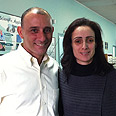
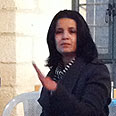
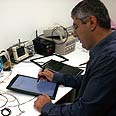
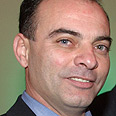
B. registered a patent, recruited workers, rented a tiny office, embarked on an exhausting fundraising journey, and received $500,000 from a foreign investor. At the same time, he underwent a strict screening process by the Industry, Trade and Labor's chief scientist and got a governmental loan of NIS 500,000 (about $143,000)
Today he is trying to make it abroad and is in talks for two major deals with an Australian company and an international printers company.
B. is a normal start-up worker, one of thousands in the blooming Israeli high-tech industry. The only difference between him and the others is that B. – whose real name is Belal Lehwany – is an Arab from Nazareth.
Solution for academicians' unemployment?
When Lehwany founded Vpsign, he was probably the only Arab high-tech entrepreneur in Israel. Today many young adults are following in his footsteps, and "Arab" start-up companies are popping up in the north like mushrooms after a rain shower.
Like Lehwany, they engage in the same fields as "Jewish" start-ups, look, talk and think like Jewish entrepreneurs, and live the same hectic and demanding lifestyle.
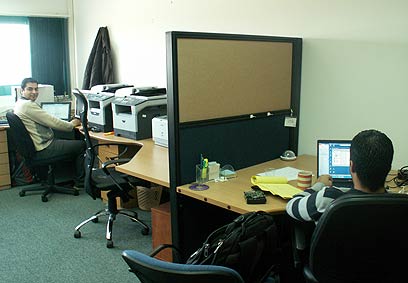
According to the Tsofen organization, which helps Arab high-tech engineers, there are five medium-sized high-tech companies and several dozen start-ups founded by Arab entrepreneurs in Nazareth and the industrial zones in Nazareth Illit, Tefen and Gush Segev, and another start-up company in the Bedouin village of Hura in the Negev region.
Six of the start-ups are part of the NGT Technological Incubator, which was established in Nazareth in 2002 with the help of the chief scientist in a bid to encourage Arab employment. According to data compiled by the Industry, Trade and Labor Ministry, the exports of all six companies total some $10 million a year.
Most of the workers employed by Arab entrepreneurs are Arab, but there are some Jews too. According to Tsofen's figures, they all employ a total of 250 Arab research and development workers, in addition to the Galil Software company from Nazareth, which was founded by Jewish entrepreneurs but employs dozens of Arabs, including CEO Inas Said.
"Most 'Arab' companies were established in the past three years," says Tsofen CEO Smadar Nehab. "The Arab high-tech in Israel is in the place the Jewish high-tech was in the 1980s – with limited activity but a momentum and huge potential."
The Arab sector suffers from high unemployment rates (especially among men) and a high rate of people (especially women) who are not even looking for work. Tens of thousands of Arabs complete their scientific and technological studies in the Technion, universities and colleges, but face difficulties finding work in the high-tech industry.
A survey conducted by the Industry, Trade and Labor Ministry found that some 80% of the Arab graduates of scientific and technological studies are not working in the profession they studied, but rather in teaching, industry and services.
Tsofen estimates that the Israeli hardware and software industry employs some 850 Arab research and development workers, and that several hundred others work in the biotech industry. These figures refer to about 2% of 80,000 research and development workers in Israel, although more than 20% of Israel's residents and 10% of the graduates of faculties of science are Arabs.
According to the ministry survey, most Arab university graduates believe they are suffering discrimination and lack of ties in the labor market, in which most entrepreneurs and managers are Jewish.
Tsofen helps the Arab engineers with the courses they study, writing a resume in Hebrew and passing an interview with a Jewish employer, as well as with PR activities.
"We created awareness for the existence of the problem," says Nehab. "The awareness encourages Arab entrepreneurs to start their own companies, and they provide Arab university graduates with work."
No security check
Lehwany employs six Jewish workers and six Arab workers in his companies. "It is in my interest to favor Arabs, because I receive aid from the State to do that," he says. "But professional considerations come first, and I only take people with experience, and there are not so many Arab engineers with experience because of the difficulties they face getting hired by 'Jewish companies'. It's a vicious circle."
"I know there is discrimination although I haven't been affected by it personally," says Lehwany. "On the contrary: Being an Arab has actually helped me. B.O.S. was looking for an Arab worker in order to enter the Egyptian market. In the end I struck a small deal in Egypt and the company gained a good employee and gave me senior roles, until I left over professional differences.
"Even as an entrepreneur, it's easier for me to get help from the chief scientist thanks to the affirmative action policy.
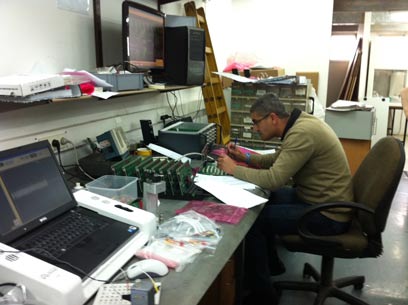
"I've encountered discrimination myself only in small and delusional cases. Once I arrived for a meeting at a defense industry company which bought a data protection technology from me, but the security guards wouldn't let me into the office for security reasons.
"It's funny that a person with a criminal record can get in, but a person like me – who has never been in a police station – is forced to stay outside. But the fact that the defense industries work with me proves that there is a welcomed change of approach."
Opening own company
The biggest and most veteran "Arab" high-tech company is probably Alpha Omega of Nazareth Illit, which develops technologies for recording information on tiny clinical electrodes. The company was founded in 1994 by Rim and Imad Younis, a couple who manages it together to this very day.
"Imad completed his electrical engineering studies at the Technion in the 1980s, and at the time the entire high-tech industry was connected to the army and completely irrelevant for Arabs," says Rim. "The only company which was really civilian was Intel, but he didn't get a job there.
"Eventually, he began building devices for experiments in the Department of Biomedical Engineering at the Technion. Then he started working as a freelancer and selling devices to researchers. And then they began using his device in surgeries for Parkinson's disease. That's when we said to ourselves, 'Let's sell the device all over the world.'"
Rim, who studied civil engineering and faced difficulties finding work in her field as well, joined Imad on a trip across the United States, after which they managed to sell the device to several hospitals.
They later set up a small production line, and today they employ 27 workers and export devices at some $7-8 million a year – most of the 'Arab' high-tech's exports. All this from an investment which came from their own pockets.
"We want to find an investor, but we haven't succeeded," says Rim. "Venture capital funds and 'angels' (private investors in high-tech) are a world of networking based on a connection between Israeli Jewish entrepreneurs and investment managers with American investors. As Arabs, it's hard for us to get there. But we'll succeed. In 2008 we almost signed a major deal with an investor, but it was eventually canceled because of the crisis."
Alpha Omega's website emphasizes that it is an "Israeli company", as opposed to some of the "Jewish" companies which conceal their national identity. "We present ourselves abroad as both Israelis and Palestinians," says Younis. "This is what we are, and you must be what you are. In Arab countries we're are treated worse than Jews, so we don't try to get in there."
'Feeling of inferiority from childhood'
Most of the workers at Alpha Omega are Arab – but not all. "The most important thing for us is that for the worker to fit in professionally," says Younis.
"We also take engineers without any experience because there are many good Arab engineers who have not been hired by 'Jewish' companies. But our classification is tough and we only hire those who have graduated from university or the Technion with good grades."
In your opinion, are Arabs not hired by 'Jewish' companies because of discrimination, lack of connections, language problems or insecurity in interviews?
"All together. There is discrimination, and the State has now woken up and is making serious efforts to fix it, and on the other hand, we Arabs have emotional problems. We have been walking around with feelings of inferiority since our childhood.
"The community I grew up in and the school I studied in don't look like yours, and the fact that I'm in the periphery is another disadvantage. These things make an Arab worker treat himself differently and make it difficult for him to find a job."
And is the solution for them to work in companies like yours?
"I believe so. Our vision is to provide services to Nazareth's residents and give them work. The vision rolls on: Two of our talented Arab workers were inspired by us, left and started their own companies."
What is your tip for an entrepreneur beginning his career?
"Not to despair. You'll fail once, twice, but you'll succeed the tenth time. If I weren't optimistic, I wouldn't be here. It's crazy work, but it's fascinating, and in the end, when you look back and see that you've fulfilled your dreams, it's so much fun that it's worth it all."
'Don't set up an Arab ghetto'
Not all Israeli Arab entrepreneurs identify with Younis' vision. "I do high-tech because it's good businesses and it's what I like, not for any ideological vision," says Dr. Amal Ayoub, founder of the Metallo Therapy start-up from the NGT Technological Incubator.
"I don't think Arabs should shut themselves up in their own ghetto. I am in favor of each person coming out of their bubble and working in a suitable place, where they can yield the best results."
Metallo Therapy develops a nano-technological and medical patent: Tiny pieces of metal infiltrated into body cells and used for early diagnosis of cancer.
Ayoub, 35, founded the company about a year and a half ago, after studying biomedical engineering at the Technion and Ben-Gurion University and working in research and development in a number of "Jewish" start-up companies.
As opposed to other Arab entrepreneurs, she has no complaints about discrimination in being hired by Jewish companies, and decided to start her own company for different reasons: "Entrepreneurship is part of my nature. I have self-confidence, I don't really like being told what to do, and the connection between science and business is my greatest interest in life."
"Personally, I haven’t encountered any discrimination, although I've heard about it from others," she says. "There's a difficulty getting accepted into certain countries, because in the entire world people like those who are different less. But I believe that a good person who knows how to look – will find it."
Ayoub and her friends met with hundreds of potential investors in Israel and abroad but have failed in raising money. "We are a small company, and most venture capital funds in Israel invest in bigger companies, and abroad it's hard to fine the suitable investor who digs your invention," explains Ayoub. "Each start-up person goes through a crazy path, and there's no difference here between Arabs and Jews."
Four people work in Metallo Therapy: Ayoub, biologist Gadir Zarak (Arab), engineer Nassim Safadi (Arab) and business development consultant Ofer Pillar (Jewish). "I judge people according to their talents and skills only," she says. "I believe that working with people who are different from me is enriching and interesting and wonderful."
As far as you're concerned, is being a high-tech entrepreneur in a country of Jews, with our developed entrepreneur culture, an advantage?
"The truth is that there is an advantage in it. Mixing with Jews is for the best. I believe the planet Earth belongs to everyone, and that everyone deserves to live where they want and do what they want for a living. An Arab who works and is with Arabs learns from Jews – and the opposite."
'Building an entrepreneur culture'
"There is an amazing change in trends in the Arab sector," says NGT's CEO Prof. Nasri Said.
"When we set up the incubator, we were asked why Arabs need a special technological incubator. I said the fact is that in the other 28 incubators there wasn't even one Arab entrepreneur. Since then, dozens of entrepreneurs have passed through here, half of them Arab, some of whom are already working and producing and selling."
How does the fact that you're a designated incubator help them?
"First of all, the fact that we're in the north, where most Arabs live. Second, the fact that I'm an Arab and that the incubator is for them provides them with security. And third, we give personal training which matches their needs.
"The question in high-tech is not the entrepreneur's nation, but whether he has an entrepreneur's approach. Entrepreneurship develops at home, through school, university and the labor market. Jews have an advantage in all stages and we have to close the entire gap. But it's possible. Yes, we can."
- Follow Ynetnews on Facebook















